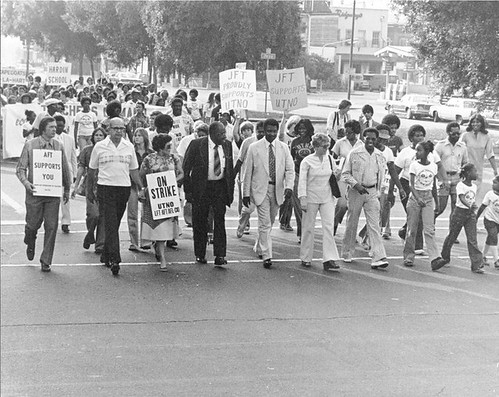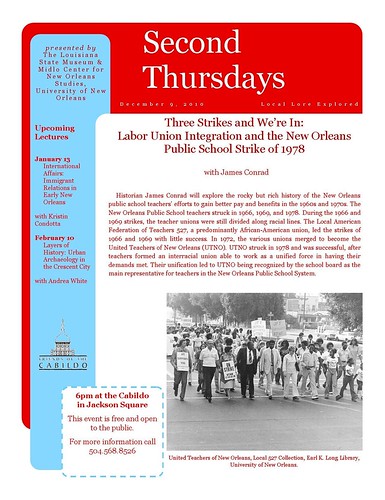Our friend James is kind of like the brother I never had. We’ve even been known to quarrel from time to time. I remember some years ago when James went back to school and started studying history in earnest. That he’s now presenting original research at the Louisiana State Museum fills me with a feeling I can only describe as fraternal pride.
The subject is a fascinating one. Here’s the official write-up.
Historian James Conrad will explore the rocky but rich history of the New Orleans public school teachers efforts to gain better pay and benefits in the 1960s and 1970s. The New Orleans Public School teachers struck in 1966, 1969, and 1978. During the 1966 and 1969 strikes, the teacher unions were still divided along racial lines. The Local American Federation of Teachers 527, a predominantly African-American union, led the strik…es of 1966 and 1969 with little success. In 1972, the various unions merged to become the United Teachers of New Orleans (UTNO). UTNO struck in 1978 and was successful, after teachers formed an interracial union able to work as a unified force in having their demands met. Their unification led to UTNO being recognized by the school board as the main representative for teachers in the New Orleans Public School System.

United Teachers of New Orleans, Local 527 Collection, Earl K. Long Library, University of New Orleans
I really want to be there but I’m afraid parental responsibilities may preclude my attendance. So if you can make it, please heckle James on my behalf.
Thursday, December 9 · 6:00pm – 9:00pm
The Cabildo, Louisiana State Museum
751 Chartres Street
New Orleans, LAFree and open to the public.
Wine and appetizers provided by Friends of the Cabildo.
For more information contact Brittany Mulla at 504-568-8526 or bmulla@crt.state.la.us
This event is listed on Facebook.
Discover more from b.rox
Subscribe to get the latest posts sent to your email.

This brings back memories for me. I was in my junior year during the 1978 strike, and worried about how it would affect my plans for graduating – I had already extended my high schools years through my own dysfunction, though, so I can’t say I was too sincerely upset.
I attended Eleanor McMain on Claiborne. I recall the striking teachers keeping up a picket line on the corner of Claiborne and Nashville. My parents forbid me from crossing a picket line, so I don’t know what went on in the classrooms staffed mostly by substitute teachers. I was happy to support my parents’ pro-union stance because it meant I got to stay out late at local music clubs – sometimes all night. I remember several early morning stops to cheer on the picketers and bring them coffee, on our way home from all-night revels.
I recall one ugly little moment when the band teacher, who did not join the strike, tried to slip in by climbing atop the trash dumpster and hopping over the fence. A bunch of striking teachers ran after him, smacking them with their signs. I remember thinking at the time that it wouldn’t be easy for those folks to go back to being colleagues.